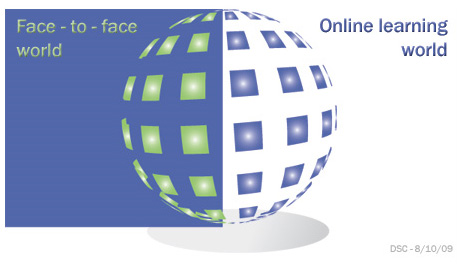Traditional education beats online in key areas, opinion poll finds — from chronicle.com by Scott Carlson
Excerpt (emphasis DSC):
In early October, Gallup asked two groups, each composed of more than 1,000 adults, whether they thought “online education is better” in a series of categories. In terms of “providing a wide range of options for curriculum” and “good value for the money,” online education got slightly better scores than traditional classroom-based education.
But online education scored much worse in four areas: in delivering “instruction tailored to each individual,” in providing “high-quality instruction from well-qualified instructors,” in offering “rigorous testing and grading that can be trusted,” and—finally, worst of all—in dispensing “a degree that will be viewed positively by employers.”
From DSC:
As you are likely able to tell, it’s hard for me not to get sucked into squabbling about which method is more effective — i.e. online vs. face to face. But ultimately, I think where we need to get to is a blended or hybrid learning type of approach — i.e. taking the best of the face-to-face world and combining it with the best of the online world. I think that will be the Holy Grail of learning.

But in regards to these criticisms of online learning, let’s take a closer look at those items from the opinion poll.
I’ll use my experience at Northwestern University to address these items.
In delivering “instruction tailored to each individual”
In K-12, that comment might hold some water. However, in many collegiate settings where there are 50-100+ students in a face-to-face classroom, I don’t think that’s the case. In fact, at Northwestern, I doubt that most of my professors even knew who I was, let alone ever tried to custom tailor any instruction for me in those face-to-face settings. Granted, I need to own my part of this — that is, I should have taken more advantage of their office hours. But I’m not sure that my professors even graded/assessed my work. Often my work was graded by graduate students/TA’s who likely had 0 (zero) training or background in education. For that matter, the professors I took courses from most likely did not have any background in teaching and learning, nor coursework in pedagogy/education. They were likely more concerned with how to present the material to 100+ people — not with tailoring it to each individual.
“In providing “high-quality instruction from well-qualified instructors”
See above. Also, my guess is that many face-to-face professors were hired at Northwestern for their research skills and what they brought to the table in that regard. They were screened, I’m quite sure, for how prospective professors’ reputations would contribute to Northwestern’s brand and bottom line. Doing research is not the same thing as teaching students. Knowing something and being able to teach someone are also two different things. Teaching is both an art and a science (and learning is messy).
“In offering “rigorous testing and grading that can be trusted” — this carries the most weight of the above concerns. However, there are an increasing amount of options here — from proctored tests to software tools (and in the future, most likely solutions will take the form of biometric security/scanning used in conjunction with webcams). For those who decide to cheat, I give a heads-up:
“Consider for a moment — if you do cheat — how you are going to get by those interviews where the interviewer is going to want to see first-hand evidence of what you can actually do. No…do yourself a favor and just do the work; you’ll be glad that you did.”
“In dispensing ‘a degree that will be viewed positively by employers.'” It’s quickly becoming the case that employers won’t have a choice (already, 32% of UG’s have taken an online course). Also, my guess is that the people who think this have never taken an online class themselves. If they had, they would know that online learning takes a lot of work. It takes very motivated, committed students — the type of “self-starters” most companies that I know of want to hire.
Final comment:
- I need to get down off my soap box now. But I do wish that folks would apply the same level of scrutiny to 100% face-to-face and blended learning courses as they do to 100% online courses. (Can you imagine the increase in quality that many universities and colleges would experience!?)








